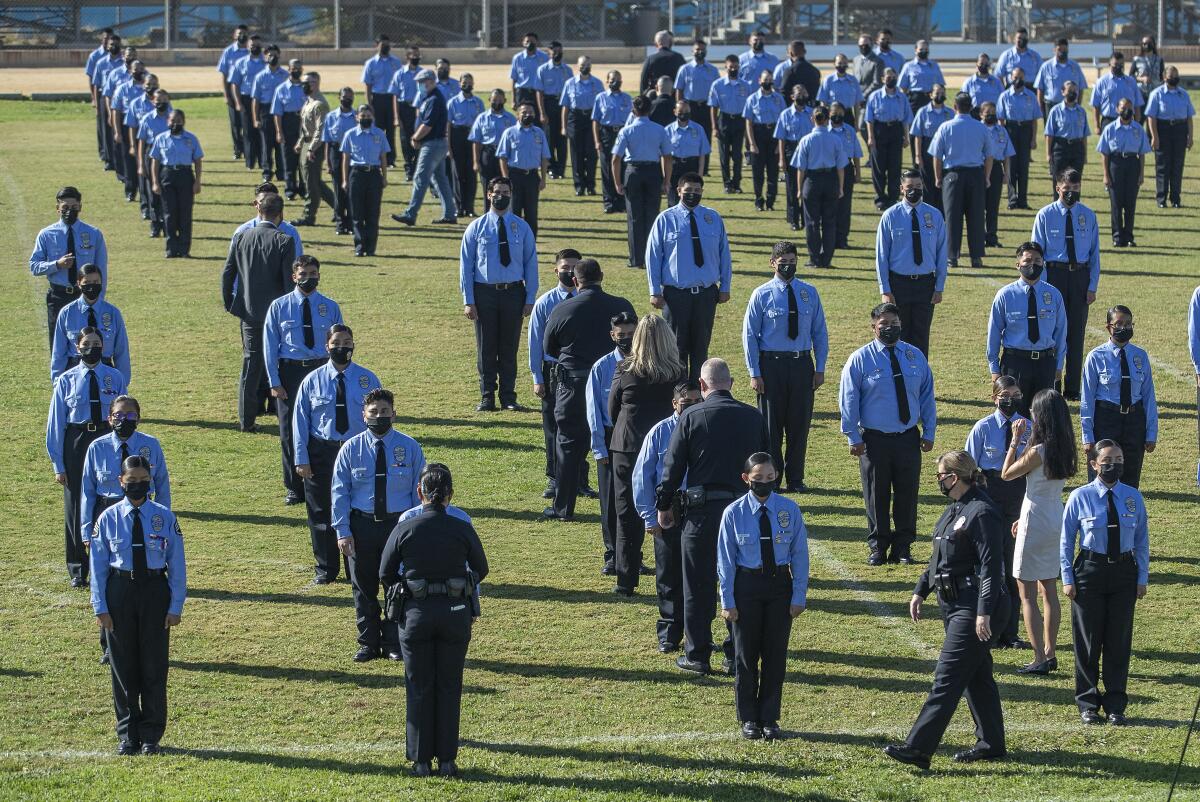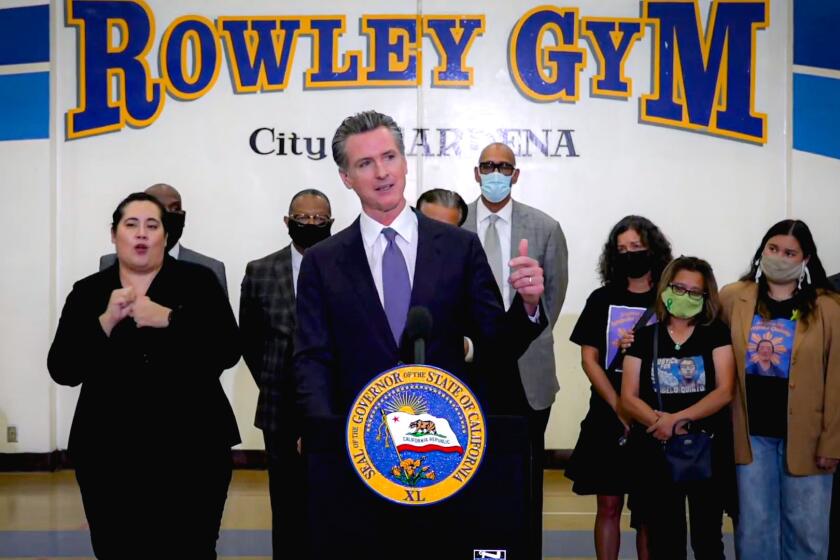California might have thousands of cops who are unfit to wear a badge. This is why

- Share via
Justin Tackett’s troubling history of warrantless searches, falsified reports and insubordination as a sheriff’s deputy in Imperial County finally prompted the Sheriff’s Department to initiate termination proceedings against him. But Tackett resigned once he learned of the department’s intent and got a job with the U.S. Border Patrol, his peace officer certification still intact. It was in his capacity as a federal agent that Tackett, in 2012, shot and killed Valeria Tachiquin Alvarado, a mother of five who was attempting to drive away from him.
Tackett’s disturbing example isn’t as extraordinary as it should be. A California commission with new powers over police licensing recently estimated that it could be on the verge of barring thousands of officers from law enforcement by stripping them of their certification.
For decades, California police officers who committed serious crimes or engaged in grave misconduct were allowed to avoid termination by quietly quitting and finding jobs in other departments. They were able to do that because California had some of the strongest legal protections for law enforcement officers in the country.
That began to change this year, when California became the 47th state to gain the power to decertify police officers. Legislation that took effect on Jan. 1 allows the state Commission on Peace Officer Standards and Training to revoke officers’ certification, disqualifying them from law enforcement employment across California.
The California Legislature has encountered steep resistance to the most basic form of standard-setting for police: Decertification. It’s time for cops to drop their opposition.
Before the Legislature passed and the governor signed Senate Bill 2 in 2021, the commission had the authority to certify police officers and cancel certificates awarded in error or obtained fraudulently. But it could not decertify officers for improper or criminal conduct.
A bill to remedy that in the wake of the George Floyd killing died in the state Assembly in 2020 amid an all-out campaign of misinformation and fear mongering by police unions, insurers and municipalities. Opponents falsely claimed that the legislation by state Sen. Steven Bradford (D-Gardena) would have a “chilling effect” on law enforcement and that officers could lose their licenses for offenses as minor as jaywalking.
But the decertification bill, which specified only “serious” misconduct as warranting the penalty, had strong support from community groups, families affected by police misconduct and civil rights organizations and activists. Hundreds of music, entertainment and sports figures signed an open letter urging the governor and lawmakers to approve the bill. One of the proponents’ most powerful points was that California was one of only four states with no such mechanism to hold bad cops accountable and prevent future abuses.
According to the Bureau of Labor Statistics, nearly a quarter of the U.S. workforce — comprising some 39 million Americans — is regulated by certification or licensing. Not just lawyers and doctors but also plumbers and makeup artists are regulated and investigated by state agencies that oversee their licensing. But in California, until this year, cosmetologists armed with cuticle scissors were more vulnerable to delicensing than police officers able to deploy lethal force.
That is no longer the case, thanks to a successful push for similar legislation the following year. As a result, the newly empowered police standards commission recently estimated that it could decertify or suspend up to 3,500 police officers each year for serious misconduct. According to a commission budget request, approximately 4% of the roughly 90,000 officers working in California are expected to be decertified or suspended for serious misconduct such as sexual assault, excessive force and perjury.
The changes include raising the minimum age for officers to 21 and allowing badges to be taken away for excessive force, dishonesty and racial bias.
The commission’s remarkable forecast highlights the extent to which accountability has been seriously lacking in California law enforcement. It suggests that local governments and police unions pushed back against decertification knowing that thousands of officers had engaged in serious crimes and misconduct.
Victims of police wrongdoing and their families had been sounding the alarm for decades; for them and others in the communities most affected by the problem, these numbers are not surprising. Police departments are not able to effectively police themselves, and the thousands of misconduct complaints already fielded by the commission speak to law enforcement’s epic failure to rein in abuses within its own chains of command.
Going forward, true accountability will require transparency. The public led this fight, and our communities deserve the truth. That’s why it’s so disappointing that Gov. Gavin Newsom moved to make it more difficult for the public to access information about the commission’s investigations of abusive and unfit officers.
California, which was already nearly the last state to hold our law enforcement officers accountable, should stop competing in this race to the bottom. Failing to police those who police us only further erodes public trust while casting a shadow over the vast majority of peace officers who serve the public bravely, honorably and respectfully.
Julia Yoo is a San Diego-based civil rights attorney and the president of the National Police Accountability Project.
More to Read
A cure for the common opinion
Get thought-provoking perspectives with our weekly newsletter.
You may occasionally receive promotional content from the Los Angeles Times.











